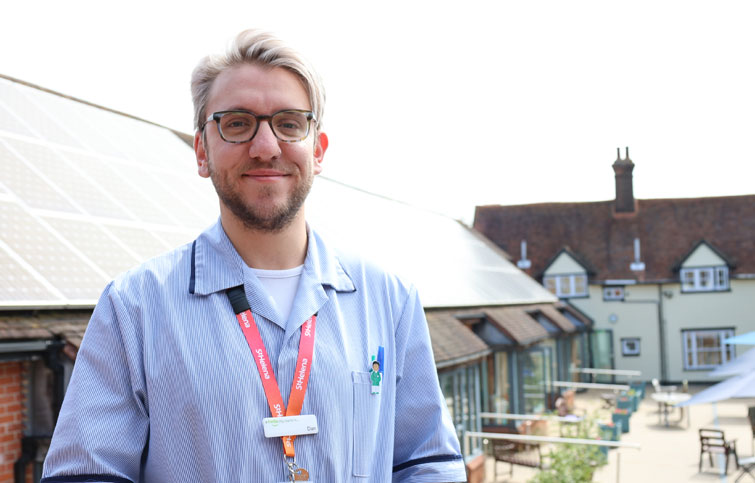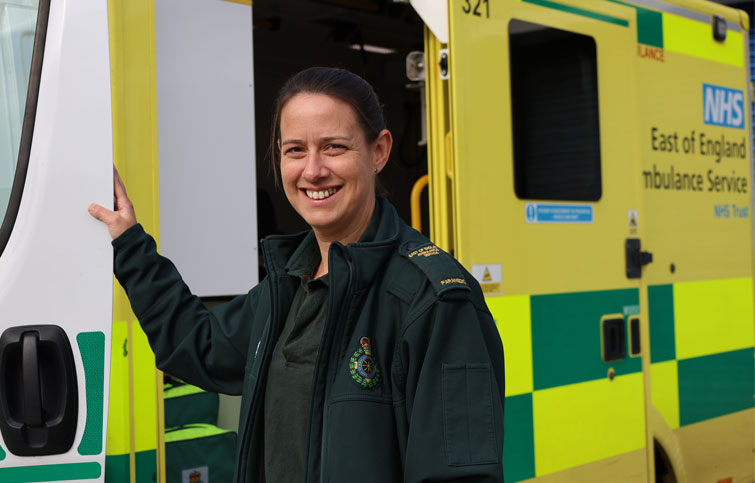Make a difference
People like you help us every day through regular donations
Read stories DonateThree paramedics are working in rotation between the ambulance service and St Helena Hospice’s SinglePoint service – a 24/7 helpline and rapid response service for people receiving end of life care and support at home across north east Essex.
The split role offers a unique opportunity for collaborative working, while sharing skills and knowledge between the organisations. It is focused on helping people at the end of life get the help they need, while respecting with their wishes to remain at home and avoid unnecessary hospital admission.
“For our patients, it's keeping them in a place where they want to be cared for and giving them support so they can remain at home and are less likely to be conveyed to hospital.
“Having the paramedics on the team has added value to our SinglePoint service. Their skill sets are different so they can go out and do their assessment and diagnostics, and if a patient has fallen, they can do wound care there and then.
“We're now getting more calls from paramedics out on the road generally because the paramedics working with us are giving their colleagues information about what we can do at St Helena, whereas their first thought previously would have been to take the patient directly to hospital. The paramedics feel more comfortable having conversations about advance care planning and recognising that's needed for patients and the dying process.
“Having our clinicians embedded within St Helena Hospice’s SinglePoint service means the nursing team can benefit from our staff’s training in making swift assessment, allowing them to assess and deal with many of patient’s non urgent issues – often without the need to call an ambulance or transport them to hospital.
“This ensures people can get the care they need, while staying in their own home for as long as possible.”
For the ambulance clinicians, dealing with end of life patients and supporting their families are another set of professional skills they can develop. They can also take a further training module in end of life care that EEAST has developed with the University of East Anglia.
“During the day shifts on my roster, I come into the hospice and I'm based out of SinglePoint, doing patient assessments and assistance and trying to help keep people at home. And then during my night shifts, I work for the ambulance service on either a rapid response car or on an emergency ambulance as a paramedic going to a wide range of calls. This allows me to keep up all of my chronic and acute assessment and treatment skills.
“It produces a really nice merger of roles because it means I'm constantly able to keep updated with new treatments and medication and management of conditions, and I can bring that learning into the Hospice for patients to be treated at home. And likewise if, as a paramedic, I go to someone who's deteriorating quite rapidly or may present as being end of life in the community, I can bring the knowledge learned from St Helena Hospice.
“The biggest benefit I've learned being at St Helena Hospice is the communication aspects of speaking to patients and family about the advance care planning side of things.
“The biggest skill or knowledge I’ve brought into the Hospice as a paramedic is the acute assessment skills; they have proved to be really beneficial to help identify whether something is actually treatable at home.”
“St Helena is a pioneer in its use of its SinglePoint 24 hour phone service, which offers advice and home visits to people in north east Essex receiving end of life palliative care. This helps support people in the community and prevent the need for admission to hospital.
“As a paramedic, I have training and experience in going into people’s homes and assessing them quickly and independently, and I can use that experience to support the hospice’s team of nurses and nurse prescribers in deciding if patients need rapid hospital admission or additional support with their palliative care.
“There aren’t that many opportunities for paramedics to work in specialist fields as far as I know, so this is a unique opportunity to develop my skills while working alongside clinical specialists.”
“It's extremely valuable for both services for improving our response to end of life patients.
“On my first day I went out with two St Helena nurses and I was absolutely amazed at what the Hospice provides. We went to a patient not known to the Hospice previously and who was very poorly. They managed to get them care, equipment and medication and did their advance care planning, all within a day.
“It's given me the confidence and the skills to recognise patients within their last weeks and months and is giving us the tools to know all the pathways available and the support St Helena provides.
“Now, as a paramedic, where I previously would have been more inclined to take an end of life patient to hospital due to lack of knowledge of the support that could be offered in the community, I feel confident in liaising with St Helena to access further patient information, which enables me to make a better clinical and holistic assessment. We can then make a shared decision with regards to the most appropriate pathway for that patient.”

When you make a donation to St Helena Hospice, we are charged transactional fees by other companies, including fees for processing payments made to us, looking up addresses and validating bank account details.
We are very grateful to our donors who offer to offset some of these fees with a minor addition to their total amount. This is however completely optional and we are very grateful for your support whether or not you choose to contribute to processing fees.
CloseWe are able to claim an extra 25p on every £1 on your donation amount for no extra cost to you, as long as you are a UK tax payer; have paid enough income tax or capital gains tax in that tax year; and are donating your own money. If you pay less income tax and/or capital gains tax than the amount of Gift Aid claimed on all of your donations in that tax year it is your responsibility to pay any difference. For more information about Gift Aid, please visit https://www.gov.uk/donating-to-charity/gift-aid



